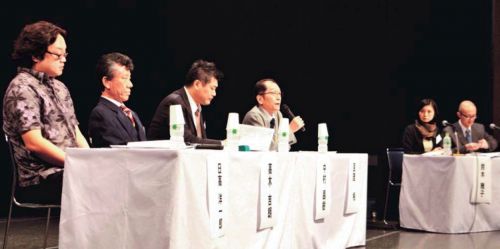International Human Rights Law Association holds Japan-Okinawa debate regarding UN review

On November 26 at Times Hall in Naha, speakers respond to attendees' questions about Okinawa in relation to international human rights law.
November 27, 2017 Ryukyu Shimpo
The International Human Rights Law Association (IHRLA), chaired by Shin Hae Bong, held its 29th annual meeting over two days starting on November 26 at Times Hall in Naha City. At this meeting, lawyers and researchers from around Japan discussed lawsuits concerning U.S. bases in Okinawa, such as the current lawsuit aimed at stopping new base construction in Henoko, and how these lawsuits relate to international human rights law. There was also a report addressing the Universal Periodic Review (UPR) of Japan’s government conducted by the United Nations Human Rights Council (UNHRC) at the meeting.
During the discussion on lawsuits Chuo University Professor Tadasu Watari said of the earlier Henoko lawsuit, “[the court] came to its conclusion without even one appeal addressing the severity of matters such as the worth of the environment that will be destroyed through land reclamation work.”
Kichiro Takagi, a defense lawyer in the third Kadena noise lawsuit, brought up the Supreme Court decision on the 1959 Sunagawa Case, which was the court’s basis for rejecting the request to halt U.S. aircraft flights. He said: “The Supreme Court overturned an initial decision that U.S. stationing [in Okinawa] was unconstitutional by citing the political question doctrine. It also set forth [in its decision] that U.S. stationing does not breach Article 9 of the Constitution.”
Takagi also criticized the Supreme Court because it has the authority to make big decisions, yet avoided doing so.
Participants from Okinawa and the rest of Japan provided their opinions of the UN’s UPR.
Director Masatoshi Sugiura of the Human Rights and Humanitarian Affairs Division of the Foreign Policy Bureau, Ministry of Foreign Affairs, addressed the UN’s recommendation that the Japanese government protect the human rights of Okinawans as an indigenous people. He said, “At this time the government recognizes the Ainu people as indigenous people.” Following this dismissal he continued, “Under the Constitution all are guaranteed equal rights.”
A representative of the All Okinawa Council for Human Rights (AOCHR) and professor at the University of the Ryukyus Jun Shimabukuro said that Okinawa researchers have come together and addressed the UPR by submitting a written report on four issues affecting Okinawa. He also pointed out that the Japanese goverment has not yet responded to Peru’s recommendation that it promote economic, social and cultural rights for the people of Okinawa.
Eiichi Hoshino, another representative of AOCHR and professor at the University of the Ryukyus, gave examples of citizens who oppose U.S. base construction being arrested, and explained that this violates their freedom of expression. Representing AOCHR, he reported on what actions the council is encouraging the UN to take.
(English translation by T&CT and Erin Jones)
Previous Article:The “Pride of Okinawa” dominate the Male Team Kata to take the gold at Karate 1 – Series A Okinawa Tournament
Next Article:Waste site trouble caused suspension of garbage collection from military
[Similar Articles]
- [Editorial]The Supreme Court’s decision on Takae lawsuit is unjustifiable
- Professor Matsushima makes a statement at the U.N. demanding universities return Okinawan ancestral remains
- Futenma roar appeal dismissed by Supreme Court without issuing a flight ban
- History book on human rights in Okinawa published
- Kyoto District Court dismisses lawsuit calling for return of remains to Okinawa
 Webcam(Kokusai Street)
Webcam(Kokusai Street)


